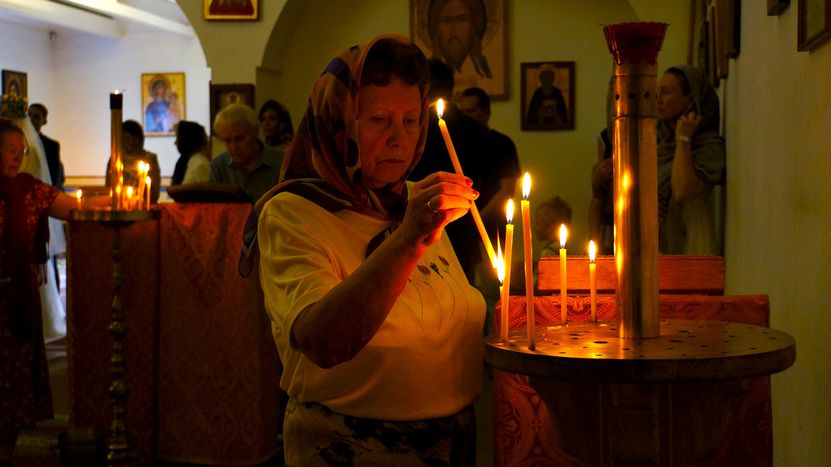
Charlottengrad Revisited: The Cold-Hearted Europeans of Russian Berlin
Published on
In the early 1920s, Berlin’s Charlottenburg district was nicknamed 'Charlottengrad', as it was flooded with Russians who had left in the wake of the revolution. Today, the German capital is home to between 200,000 and 300,000 Russian-speakers. It is a community of EU citizens “against all odds”, so it seems. Or would they disagree?
At supermarket Rossiya, right next to Charlottenburg station, there is no escaping from the Russian dumplings, wine, vodka and the classic Alyonka chocolate. It seems a natural place to start my tour of Russian Berlin. The shop also offers a small cosmetics section, since “Russian girls only trust make-up products made in Russia”, or so I am told. The vendors all wear the same red t-shirt, which proudly reads Russia, in blue and white Cyrillic letters.
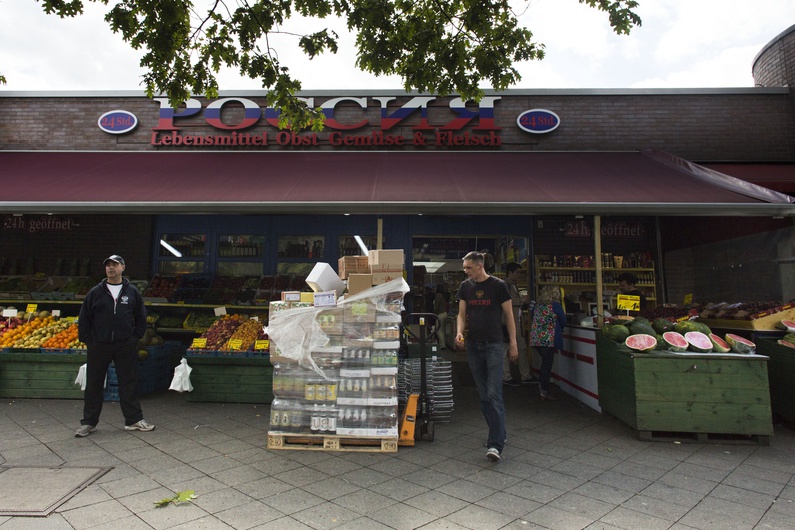 Rossiya-fashion aside, it is more appropriate to speak of the Russian-speaking community in Berlin, as its members hail from different areas and belong to different ethnic groups. “In fact, there are three groups,” Stefan Melle tells me, when I meet him in his office at the German-Russian exchange organisation. “There are the so-called accidental refugees, Jews who came from the former Soviet Union under an administrative accord with Germany. But the majority of the community is actually of German descent. The third group is more diversified, all from different former Soviet republics.”
Rossiya-fashion aside, it is more appropriate to speak of the Russian-speaking community in Berlin, as its members hail from different areas and belong to different ethnic groups. “In fact, there are three groups,” Stefan Melle tells me, when I meet him in his office at the German-Russian exchange organisation. “There are the so-called accidental refugees, Jews who came from the former Soviet Union under an administrative accord with Germany. But the majority of the community is actually of German descent. The third group is more diversified, all from different former Soviet republics.”
Russian Berlin
Stefan’s organisation used to help the migrants integrate in Germany, especially during the 1990s. But today, there are fewer newcomers. “Many are second or third generation migrants. They run their own business, send their children to bilingual schools, they are very well integrated.”
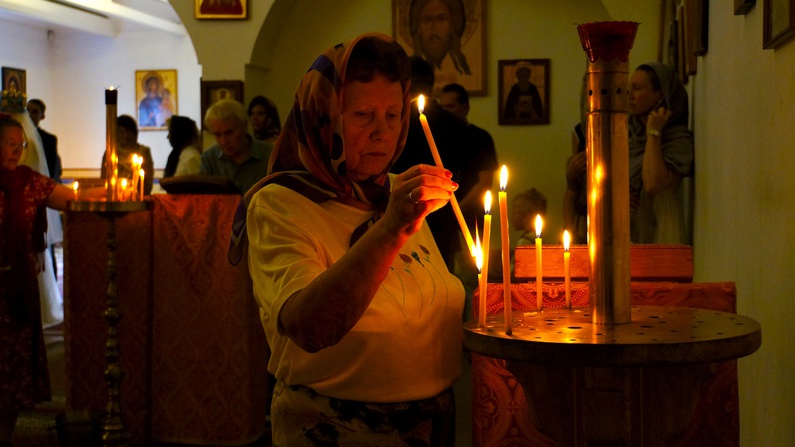 Yet, the 1920s concept of Russian Berlin still holds true for the older generations, who live an authentic Russian life in the German capital. “Some people here never learnt any German,” says David, a young German of Russian descent, who lives in Berlin with his Russian wife. “I’m guessing their worldview corresponds to the general Russian perspective. After all, they are mostly following the news through Russian media.”
Yet, the 1920s concept of Russian Berlin still holds true for the older generations, who live an authentic Russian life in the German capital. “Some people here never learnt any German,” says David, a young German of Russian descent, who lives in Berlin with his Russian wife. “I’m guessing their worldview corresponds to the general Russian perspective. After all, they are mostly following the news through Russian media.”
Therefore, it seems unlikely that these Berliners feel any sense of belonging towards the European Union of which they are part. Indeed, “they relate much more to nation-states, not to transnational organisations,” Stefan tells me. “It is Germany that is positively identified with welfare and stability, rather than the EU.” David seems to agree: “But the relations between the EU and Russia, particularly with the events in Ukraine, are being discussed all the more.”
Troubled Europe
The word is out. Inevitably, the Ukrainian crisis looms large over my visit to Russian-speaking Berlin. Yet, according to Stefan, the real turning point in the perception of the EU occurred in 2008. “For many, the crisis meant the end of the EU as a guarantor of welfare. The EU seemed weak, unable to get a grip on its economy. 2008 was also the year of the conflict in Georgia, where the EU was perceived to have made a wrong and overhasty reading of the situation.”
This overwhelmingly negative perception of the EU has not changed much since, quite on the contrary. My impression is confirmed when David introduces me to Father Andrej, the corpulent, heavy-bearded and slightly intimidating priest of one of the Russian Orthodox churches in Charlottenburg. Father Andrej seems widely respected in the community: while we make our way to his office, he is reverentially greeted by the visitors of the parish, many of whom drop their children off for the Saturday religious and language classes.
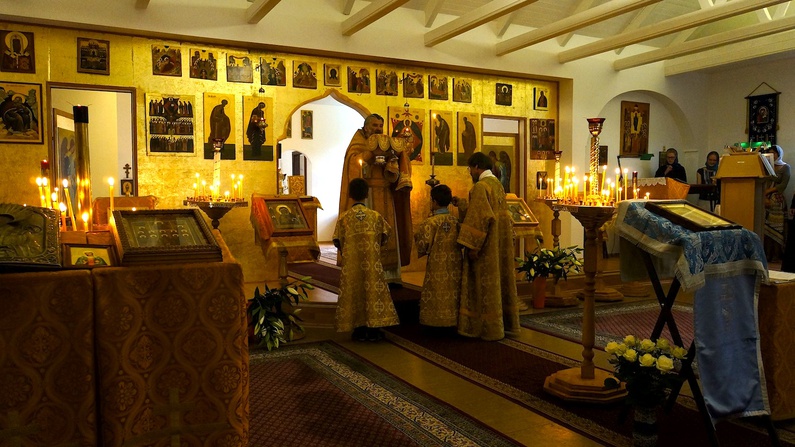 When I ask him about his views on European integration, the priest is categorical: “The EU is a failure. Here, in the parish, we do discuss European politics. We all wonder when the EU will crumble and fall apart. Who believes in this European project anyway? A project of peace? Oh, come on. What about the troubles in Northern Ireland? Or the animosity between Germans and Greeks today?”
When I ask him about his views on European integration, the priest is categorical: “The EU is a failure. Here, in the parish, we do discuss European politics. We all wonder when the EU will crumble and fall apart. Who believes in this European project anyway? A project of peace? Oh, come on. What about the troubles in Northern Ireland? Or the animosity between Germans and Greeks today?”
War of Propaganda
While blaming the EU for being docile and gutless, uncritically kowtowing to the US on the Ukrainian issue, Father Andrej is slightly milder towards his country of residence: “We feel a responsibility towards the German state, of which many of us are citizens. But definitely not towards the EU.”
Many in the community point to the pernicious effects of the media, held responsible for a widening gap between Russia and the EU. While Father Andrej vehemently warns of a 'propaganda war', resorting to vague examples of what he sees as US-paid coverage of the 2008 Georgian War, David is more prudent. “But it is true that if you look at the Western coverage of the Ukrainian crisis, you see stereotypes reminiscent of the Cold War popping up,” he argues.
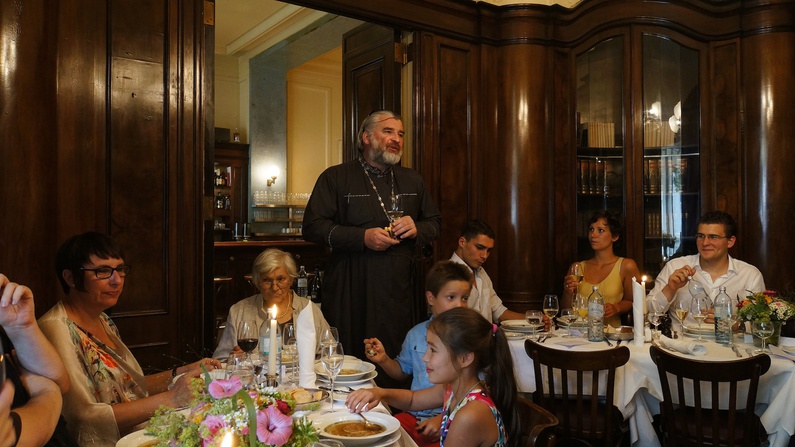 “Think about the image of Volker Beck (German politician — Ed.) being beaten up by aggressive, homophobic and hostile Russians. This is the image being conveyed, there is no counter-discourse. While Russia feels proud to be a European nation, people here tend to look at Russia as some far-away eastern, even Asian country. I think we are in need of more bridging figures.”
“Think about the image of Volker Beck (German politician — Ed.) being beaten up by aggressive, homophobic and hostile Russians. This is the image being conveyed, there is no counter-discourse. While Russia feels proud to be a European nation, people here tend to look at Russia as some far-away eastern, even Asian country. I think we are in need of more bridging figures.”
Waiting for Merkel
Is it up to Germany to fulfill such role? After all, the country has a historic legacy of bridging the gap between East and West, and is currently governed by a chancellor who speaks fluent Russian, while her Russian peer keeps close ties to the country where he was stationed for five years. “Germany is a key player, but they are making big mistakes in handling the Ukrainian conflict. Merkel is respected, both in Russia as in the Russian-speaking community here. She is trying her best, but she’s simply not stepping up to the Americans,” snorts Father Andrej.
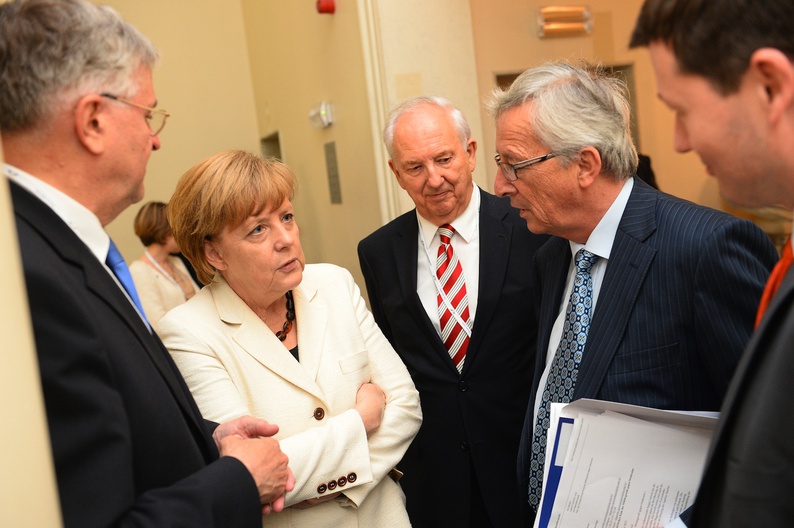 David is less critical towards his home country. Yet, he is convinced that Germany should do much more to improve the fragile EU-Russia relationship. “When I see all the potential that Germany has, and I see how underexploited the opportunities are, I can get really angry. Germany needs to step in as a mediator and engage with Russia. Otherwise movements such as Front National or Jobbik will do it, but not in a way that is good for Europe.”
David is less critical towards his home country. Yet, he is convinced that Germany should do much more to improve the fragile EU-Russia relationship. “When I see all the potential that Germany has, and I see how underexploited the opportunities are, I can get really angry. Germany needs to step in as a mediator and engage with Russia. Otherwise movements such as Front National or Jobbik will do it, but not in a way that is good for Europe.”
For more information about the German-Russian Exchange organisation or Deutsch-Russischer Austausch, visit their website.
This article is part of a special series devoted to Berlin. It's part of eu-topia: time to vote, a project run by cafébabel in partnership with the hippocrène foundation, the european commission, the ministry of foreign affairs and the evens foundation.





